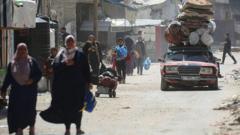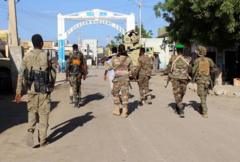The recent developments in Rafah, where hundreds of thousands are displaced, raise humanitarian concerns amidst military operations.
Israel Expands 'Security Zones' to Include Rafah Amid Ongoing Gaza Conflict

Israel Expands 'Security Zones' to Include Rafah Amid Ongoing Gaza Conflict
Israel's Defense Minister announces the inclusion of Rafah in military "security zones" to pressure Hamas for hostage release.
Israel's defense minister has recently announced plans to expand the Israeli military's so-called "security zones" in Gaza to encompass the southern city of Rafah. During a visit to the war-torn region, Israel Katz emphasized that the military aims to leave Gaza "smaller" and "more isolated," exerting pressure on Hamas to release hostages still in its custody.
The Israeli military has already established a buffer zone along the borders of Gaza, a move characterized as essential for preventing attacks. The latest expansion includes Rafah and its surrounding areas, which collectively account for nearly one-fifth of Gaza's territory, following an evacuation order directed at civilians and the creation of a corridor separating evacuees from areas like Khan Younis.
According to the UN, two-thirds of Gaza has been declared "no-go" zones or forced evacuation areas since Israeli operations against Hamas resumed on March 18, after a ceasefire that lasted two months. The UN reports that approximately 390,000 Palestinians, nearly 20% of Gaza's population, have been displaced yet again, facing a dire situation as crucial supplies of food, medicine, and fuel have been cut off since March 2.
Israel Katz asserted during his visit that the military is actively dismantling terrorist infrastructure and progressively isolating the Gaza Strip while attempting to relocate the civilian population away from conflict zones. He indicated that if Hamas does not soon release the remaining 59 hostages, including 24 believed alive, the Israel Defense Forces (IDF) would escalate operations across Gaza.
Rafah, which was home to 280,000 residents prior to the ongoing conflict, has significantly suffered from past military offensives, leaving large sections in destruction. After the ceasefire that began in January, around 100,000 residents returned to their homes only to face renewed conflict following the latest evacuation orders covering 97% of Rafah.
The strategic land reclamation by the IDF aims to mitigate potential weapon smuggling via the "Philadelphi Corridor" along the Egypt border. Israeli Premier Benjamin Netanyahu has described recent military activities, such as the seizure of the Morag Corridor, as critical in pressuring Hamas to hand over hostages.
While Katz communicated the IDF's commitment to evacuate the civilian populace from active combat areas, the UN has raised concerns that these evacuation efforts may not meet international legal standards, lacking adequate provisions for the displaced population. The Israeli government defends the evacuation measures as necessary to safeguard civilians and prevent Hamas from using them as human shields.
Additionally, the IDF reported an airstrike on the commander of the Hamas Shejaiya battalion, resulting in destruction and numerous casualties, highlighting the ongoing heightened tensions and violence in the region. The IDF's ongoing campaign against Hamas comes in retaliation to the unprecedented cross-border attack that occurred on October 7, 2023, which claimed around 1,200 lives.
As the conflict continues, the situation in Gaza remains critical, with over 50,880 casualties reported since the campaign's inception, raising alarms over the humanitarian crisis unfolding in the region.
The Israeli military has already established a buffer zone along the borders of Gaza, a move characterized as essential for preventing attacks. The latest expansion includes Rafah and its surrounding areas, which collectively account for nearly one-fifth of Gaza's territory, following an evacuation order directed at civilians and the creation of a corridor separating evacuees from areas like Khan Younis.
According to the UN, two-thirds of Gaza has been declared "no-go" zones or forced evacuation areas since Israeli operations against Hamas resumed on March 18, after a ceasefire that lasted two months. The UN reports that approximately 390,000 Palestinians, nearly 20% of Gaza's population, have been displaced yet again, facing a dire situation as crucial supplies of food, medicine, and fuel have been cut off since March 2.
Israel Katz asserted during his visit that the military is actively dismantling terrorist infrastructure and progressively isolating the Gaza Strip while attempting to relocate the civilian population away from conflict zones. He indicated that if Hamas does not soon release the remaining 59 hostages, including 24 believed alive, the Israel Defense Forces (IDF) would escalate operations across Gaza.
Rafah, which was home to 280,000 residents prior to the ongoing conflict, has significantly suffered from past military offensives, leaving large sections in destruction. After the ceasefire that began in January, around 100,000 residents returned to their homes only to face renewed conflict following the latest evacuation orders covering 97% of Rafah.
The strategic land reclamation by the IDF aims to mitigate potential weapon smuggling via the "Philadelphi Corridor" along the Egypt border. Israeli Premier Benjamin Netanyahu has described recent military activities, such as the seizure of the Morag Corridor, as critical in pressuring Hamas to hand over hostages.
While Katz communicated the IDF's commitment to evacuate the civilian populace from active combat areas, the UN has raised concerns that these evacuation efforts may not meet international legal standards, lacking adequate provisions for the displaced population. The Israeli government defends the evacuation measures as necessary to safeguard civilians and prevent Hamas from using them as human shields.
Additionally, the IDF reported an airstrike on the commander of the Hamas Shejaiya battalion, resulting in destruction and numerous casualties, highlighting the ongoing heightened tensions and violence in the region. The IDF's ongoing campaign against Hamas comes in retaliation to the unprecedented cross-border attack that occurred on October 7, 2023, which claimed around 1,200 lives.
As the conflict continues, the situation in Gaza remains critical, with over 50,880 casualties reported since the campaign's inception, raising alarms over the humanitarian crisis unfolding in the region.



















